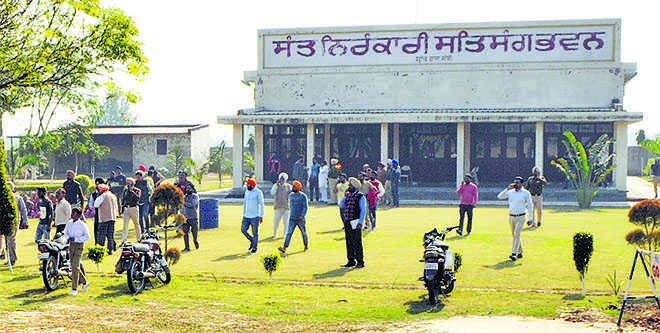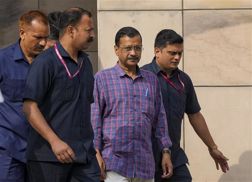
Old fear: Attack on Nirankaris has the potential to revive memories of Khalistan.
Chander Suta Dogra
Senior Journalist, Author
It was on a train journey through England's picturesque countryside a couple of years ago, when I had my first brush with what false propaganda, half truths and a distorted projection of reality in present-day Punjab can do to a seemingly reasonable, raised-in-the West, educated young Sikh youth. He had come to check our tickets, and because there weren’t any other tickets for him to check since the bogey was almost empty, he came and sat near us. Told us he was going home to Birmingham for the night.
He wore the perfect Sikh turban, had a well-groomed beard and had never been to Punjab. But he had things to say about Punjab, which I, as a journalist covering Punjab for years had never heard of. Sample this: 'Sikhs are so badly suppressed in Punjab that they have no freedom of speech. They are unable to worship freely in gurdwaras. They live in fear.'
SFJ’s referendum a mere survey
This week, as the Sikhs for Justice (SFJ), the pro-Khalistan, separatist, US-based advocacy group, declared that it was opening a permanent office in Lahore to coordinate the registration of Referendum 2020 votes, and which would also serve as an information centre for Sikhs in Punjab, it was easy to visualise volunteers like the soft-spoken ticket collector from Birmingham as part of the secessionist campaign. The SFJ had in August this year announced in London that it would hold a “non-binding referendum in 2020 among the global Sikh community on the question of secession from India and re-establishing Punjab as an independent country.”
It seemed as if a new chapter of Khalistan separatism, actively encouraged from across the border, was beginning to take shape. But the issue has left the average Sikh in Punjab quite cold, temporarily deflating the hopes of its progenitors. The hardest questions put to the SFJ were from Punjab-based pro-Khalistan groups like the Dal Khalsa and the Akali Dal (Mann), whose cooperation has, strangely, not been sought by Gurpatwant Singh Pannun, legal advisor of the SFJ, and his ilk.
The Dal Khalsa sought to know how Referendum 2020 would be done in Punjab and who would do it. How would the authentic voter be determined? It also pointed out to the SFJ that as a referendum is carried out under the guidance of the United Nations, or by the host country, it was fraudulent to pass off a “mere survey” as one, and propagate the idea that a separate Sikh state would automatically come into existence if huge numbers voted for it. And the most critical question of all was whether the so-called referendum would be limited to Sikhs or for all Punjabis.
No answers are forthcoming from the SFJ, but the organisation has gone all out to put up referendum banners and posters at Nankana Sahib in Pakistan, during the ongoing 550th birth anniversary of Guru Nanak Dev celebrations. The idea being to tap Punjabis visiting the holy shrine and possibly recruit a few youth to help it spread the campaign in Punjab.
The SFJ and Pannun have for several years now been saying that theirs is a “peaceful democratic campaign for self-determination through the ballot and not the bullet.” But, quite paradoxically, the organisation has been standing up in defence of terrorists like Jagtar Singh Tara, accused in the assassination of former Punjab Chief Minister Beant Singh. Pannun and his team of lawyers fought in Thai courts to prevent Tara's extradition to India. Pannun is known to travel across the globe to defend radical Sikhs in different countries who are wanted in India for terrorist activities.
Indian Intelligence is under no illusion about the backers of Pannun and his cohorts. The organisation's links with Pakistan's ISI are mentioned in the same breath as its name. Though Pannun has rubbished these charges, the carte blanche given to him to conduct activities from Pakistani soil can hardly be seen as benign.
Just as Punjab was digesting Pannun's announcement of Referendum 2020, and cautiously analysing its implications on their peaceful lives, the attack on a prayer meeting at the Nirankari Bhavan in the Rajasansi area near Amritsar last week by suspected terrorists brought back the old fears. On Baisakhi day 40 years ago, in 1978, terrorism was triggered by a clash between Akalis and Nirankaris in which 13 Akalis were killed.
The Nirankaris are considered a blasphemous sect by puritan Sikhs because the Nirankaris give precedence to a living guru instead of the holy Guru Granth Sahib.
Punjab has changed
But this is not the Punjab of the eighties. Hardline Sikhs now have more enemies than the Nirankaris to contend with. In recent years, the Dera Sacha Sauda has emerged as the most powerful threat to conservative Sikhism and tension between the two simmers. So, why did the terrorists choose a Nirankari congregation, as against one of the dera? Because an attack on the Nirankaris has the potential to revive memories of Khalistan. And its masterminds probably assumed that this would signal a redux of sorts to conflate with the hype being built up for Pannun's referendum.
A puerile strategy, but definitely a sign of desperation as efforts to create disturbance in Punjab by fomenting communal disharmony, reviving separatism and terrorism in recent years have failed. All those attacks on right wing leaders in the last two years — not even the shooting down of RSS’s top man in Punjab — could incite the Hindus to violence. As for the dera, ever since its chief Gurmeet Ram Rahim was convicted and sent to jail for murder and rape, it is the not the force it once was.
The average Punjabi, whether Hindu or Sikh in Punjab, is also a busier entity now, has a decent standard of living and feels that s/he can do without a distraction that pulls her/him away from the task of chasing a better house or a bigger car. Unlike the eighties when religion was the driving force in all activities social, economic and political. The two-fold stratagem of presenting Sikhs with the dream of an exclusive homeland and simultaneously inciting communal violence by attacking tactically chosen targets is not lost on anyone. It is a path Punjab has walked through, in pain.
Pannun and his Western backers might have limited success in their endeavours, but the first hurdle will be the toughest: persuading an extremely wary Sikh population to walk with them.


























